WUSA Blu-ray Movie
HomeWUSA Blu-ray Movie 
Olive Films | 1970 | 115 min | Rated PG-13 | Jul 23, 2013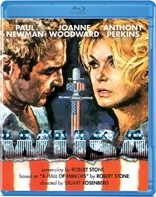
Movie rating
6.3 | / 10 |
Blu-ray rating
| Users | 0.0 | |
| Reviewer | 3.5 | |
| Overall | 3.5 |
Overview
WUSA (1970)
Paul Newman plays a jaded disc-jockey who offers his services to WUSA, a right-wing hate station broadcasting from New Orleans. While struggling with his own apathy, he starts spreading hateful messages perpetrated by Pat Hingle, a power-mad master of WUSA. Joanne Woodward plays a working girl who arrives in town the same day as Newman and falls for the alcoholic disc-jockey.
Starring: Paul Newman, Joanne Woodward, Anthony Perkins, Laurence Harvey (I), Pat HingleDirector: Stuart Rosenberg
| Drama | 100% |
Specifications
Video
Video codec: MPEG-4 AVC
Video resolution: 1080p
Aspect ratio: 2.35:1
Original aspect ratio: 2.35:1
Audio
English: DTS-HD Master Audio Mono
Subtitles
None
Discs
25GB Blu-ray Disc
Single disc (1 BD)
Playback
Region A (B, C untested)
Review
Rating summary
| Movie | 3.0 | |
| Video | 4.0 | |
| Audio | 4.0 | |
| Extras | 0.0 | |
| Overall | 3.5 |
WUSA Blu-ray Movie Review
Rush judgment.
Reviewed by Jeffrey Kauffman July 22, 2013Which came first, WUSA or Rush Limbaugh? Well, technically speaking, Limbaugh wins, for the conservative firebrand was born in 1951, almost two decades before this notorious flop film opened in 1970. It really wasn’t until around 1988, however, that Limbaugh began making national waves as one of the leading spokesmen for the so-called New Right. Had Limbaugh been the force in 1970 he later became, my hunch is WUSA would have been a much more successful film, for in its own way it presciently depicts the rise of conservative talk radio. No one had ever even heard of this idea in 1970, or at least not considered it very seriously, and so the film seemed like the left wing rantings of a cadre of ultra-liberals. Looking back now from the vantage point of the post-Limbaugh landscape (which is not to imply that Limbaugh is a done deal, only to indicate what has followed in his wake), WUSA is almost frighteningly accurate in its portrayal of agenda driven broadcasting. The left complains about outlets like Fox News, while the right laments the efforts of outlets like MSNBC, but the fact is this “new” politically motivated world of radio and television is by far the most successful “news” offered on the fragmented worlds of cable television and corporate controlled radio. WUSA is not a completely successful effort for reasons which will be discussed below, but those who dismissed the film during its brief theatrical exhibition in 1970 as completely ludicrous were obviously about as wrong as they could be. A couple of the subplots in WUSA could in fact have been “ripped from the headlines” of today’s newspapers—if in fact in this modern day world of mass media there still were newspapers.
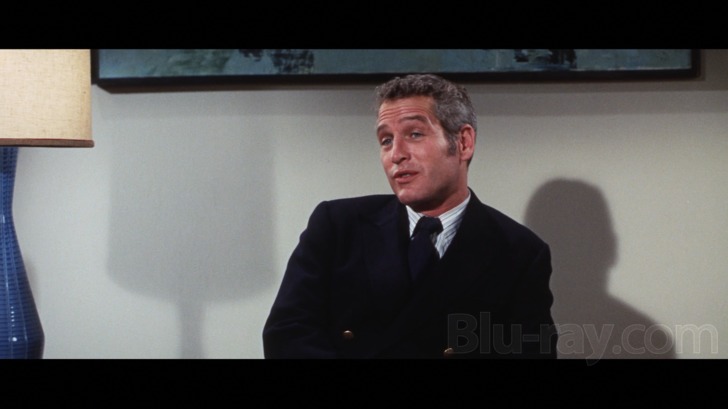
The three main characters of WUSA include Rheinhardt (Paul Newman), a hard drinking drifter who journeys to New Orleans and ultimately gets a job as a disc jockey at ultra-right WUSA. Also arriving in New Orleans at the same time as Rheinhardt and quickly meeting him is aging working girl Geraldine (Joanne Woodward), the veritable prostitute with the heart of gold who is unable to break out of her niche and find “respectable” work as a waitress. The third wheel in this odd assortment of unhappy characters is Rainey (Anthony Perkins), a native who works sporadically as a photographer but who has found employment doing a survey of welfare recipients in The Big Easy. Hovering around these four is disgraced "minister" Farley (Laurence Harvey), a philistine with a history with Rheinhardt who becomes the disc jockey's unlikely confessor.
WUSA details the three interlocking stories of these characters, adding in a kind of “vast right wing conspiracy” courtesy of WUSA’s imperious owner, Bingamon (Pat Hingle). When Rheinhardt applies for a job at WUSA, he’s told in no uncertain terms that the station has a “point of view”, and is then asked if he understands exactly what that means and what that point of view is. Rheinhardt understands, though he doesn’t seem to care all that much, as evidenced by his self-confessed description to Geraldine and her crippled friend Philomene (Cloris Leachman) that he’s actually a liberal. Rheinhardt is happy enough to pass along WUSA’s scripted blather as long as he receives a paycheck. Geraldine meanwhile obviously wants a relationship, but is met with a decided could shoulder by Rheinhardt, who finds human contact as boring as the right wing propaganda he gives voice to everyday. Meanwhile, Rainey begins to question what the real motives of the welfare survey he’s conducting are, which ultimately leads him to a supposedly shocking revelation about its connection to WUSA and Bingamon.
The performances here are mostly quite winning, although in some unexpected ways. Newman is playing a kind of low rent heel, one detached from his own emotions, and so he has little to do other than lethargically drift through the film. Woodward tugs at the heartstrings rather well, as does Leachman as her kind of bizarre friend. Wayne Rogers is on hand as a smarmy intermediary between Bingamon and Rainey and does very well in a great scene which takes place in a Playboy Club (remember those?). And Perkins is really excellent as the stuttering, tic filled Rainey, a man who wants to do well but who makes some disastrous decisions in his efforts to get there.
Paul Newman went on record a few years after WUSA’s spectacular failure (something completely unexpected since this film came in the sizable wake of Butch Cassidy and the Sundance Kid) stating that he along with screenwriter Robert Stone (adapting his novel A Hall of Mirrors) and director Stuart Rosenberg (who worked with Newman on Cool Hand Luke) injected a political element where none was needed. But quite the opposite is actually true. There aren’t enough politics in WUSA. Nothing is ever really stated outright in the film and instead the viewer is left to infer what’s going on. The closest we get to realizing the real motives of WUSA and Bingamon is when Rainey realizes Bingamon is sponsoring the survey to kick people off welfare (sound familiar?). Instead the roiling atmosphere of the film often seems to exist in a void. WUSA would have been much more effective if everything had been dealt with in a more straightforward manner. That said, the political element is given somewhat short shrift in another way here, in a kind of silly climax that plays like a B-movie mash up of The Manchurian Candidate and The Parallax View.
WUSA also is hobbled by an emphasis on too many wounded characters. There’s really no one to totally root for here, with Geraldine coming the closest. But in the time honored tradition of downer films, Geraldine does not exactly get to a happy ending. The sidebar characters, including a coterie of “hippies” (including one played by former Smothers Brothers Comedy Hour funny lady Leigh French) seem weirdly out of place, even for a 1970 film. WUSA is too portentous for its own good, and might have been better served by jettisoning some of the interpersonal dramatics and concentrating more solidly on the political element. Nevertheless, seen through the prism of what’s actually happened to mass media over the past few decades, WUSA is often startlingly accurate in its depiction of agenda driven radio. One almost has to wonder if a kid named Rush Limbaugh went to this film in 1970 and took copious notes.
WUSA Blu-ray Movie, Video Quality 

WUSA is presented on Blu-ray courtesy of Olive Films with an AVC encoded 1080p transfer in 2.35:1. Olive has been on quite a roll the last little while with some really nice looking Paramount catalog titles, and WUSA is another solid entry from the label. Colors are nicely saturated and don't appear to have faded much if at all. The image is quite well detailed most of the time (some of what I assume was the second unit photography looks slightly fuzzy by comparison). Contrast is strong and fine grain is completely in evidence. Damage is negligible enough to barely mention.
WUSA Blu-ray Movie, Audio Quality 
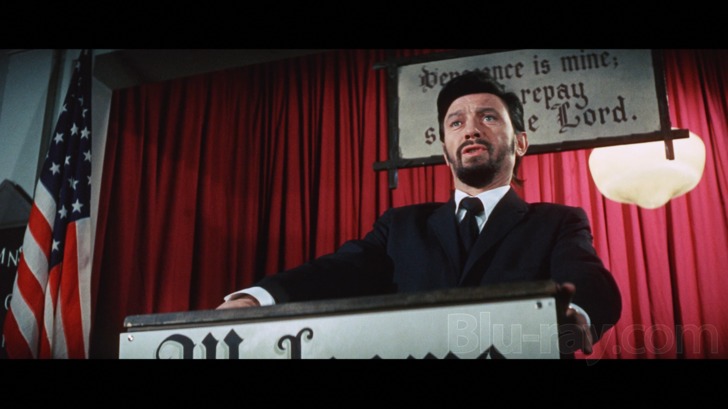
WUSA features a lossless DTS-HD Master Audio Mono track that offers excellent fidelity which ably supports the dialogue and Lalo Schifrin's score. There are some slight amplitude problems which may in fact be due to how the actors actually spoke their lines rather than any recording issues, making things occasionally just slightly hard to hear. Otherwise, though, things sound fine, with some decently wide dynamic range, to boot.
WUSA Blu-ray Movie, Special Features and Extras 
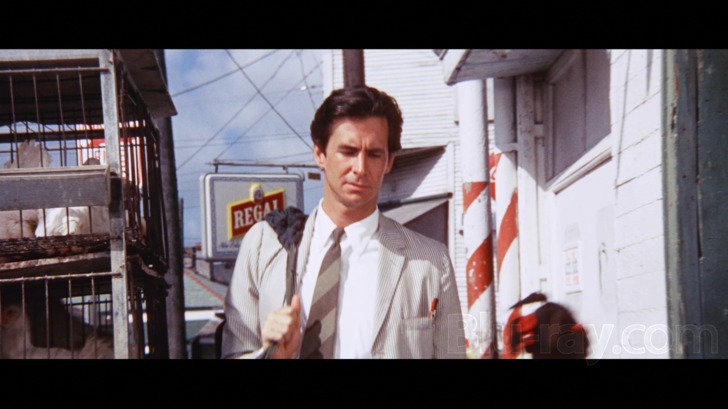
No supplements are offered on this Blu-ray disc.
WUSA Blu-ray Movie, Overall Score and Recommendation 
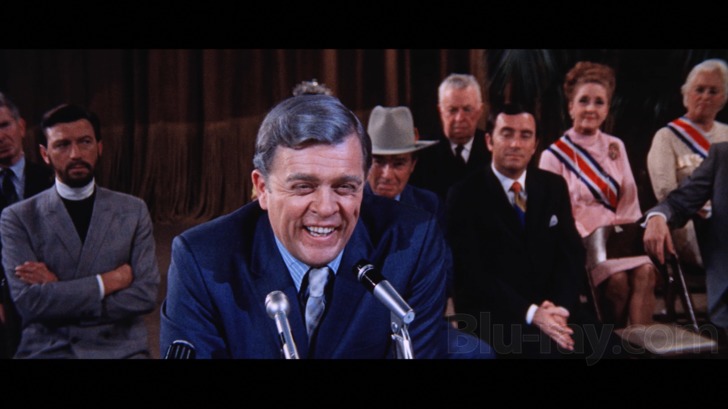
WUSA is not a totally successful enterprise, but it probably plays much, much better today than it did back in 1970,
when no one had ever heard of Rush Limbaugh or the many other conservative commentators who would follow in his
wake. The film is a bit too fragmented for its own good, and it's also maddeningly discursive at times, refusing to actually
come right out and say what it's hinting at, but even so, there are some striking (even frightening) parallels to today's
media landscape contained in this film. WUSA disappeared pretty quickly back in the day and was considered an
outright failure at the time. The film deserves a second look, and this Blu-ray offers that with excellent video and audio.
Recommended.
Note: In the unintentional irony department, there have been several entities using the call letters WUSA in the
years since the film's release and there's actually a WUSA broadcasting now, in our nation's capital of Washington ,
D.C.
Similar titles
Similar titles you might also like

Love and Anarchy
Film d'amore e d'anarchia, ovvero 'stamattina alle 10 in via dei Fiori nella nota casa di tolleranza...'
1973

I Am Cuba 4K
Soy Cuba
1964

Lola
1981

The Conformist
Il Conformista | 4K Restoration
1970

Working Girls
1986

Shock and Awe
2017

Zipper
2015

Taxi
2015

Capital
Le capital
2012

On the Job
2013

To Be Twenty
Avere Vent'anni
1978

Death of a Cyclist
Muerte de un ciclista
1955

Loveless
Нелюбовь / Nelyubov
2017

Porcile
1969

Busting
Limited Edition Reissue
1974

Leviathan
Левиафан / Leviafan
2014

Welcome to New York
2014

Young Mr. Lincoln
1939

Winter Kills
1979

The Last Hurrah
Limited Edition to 3000
1958